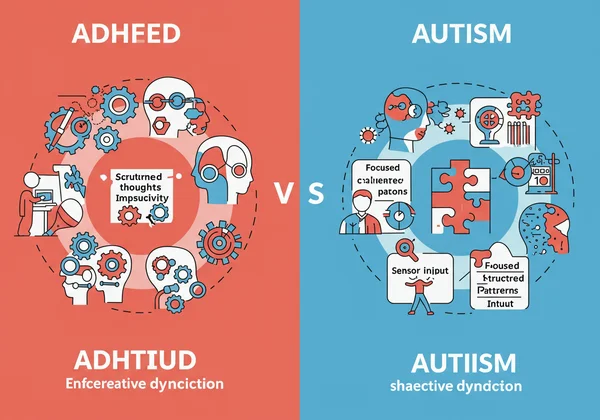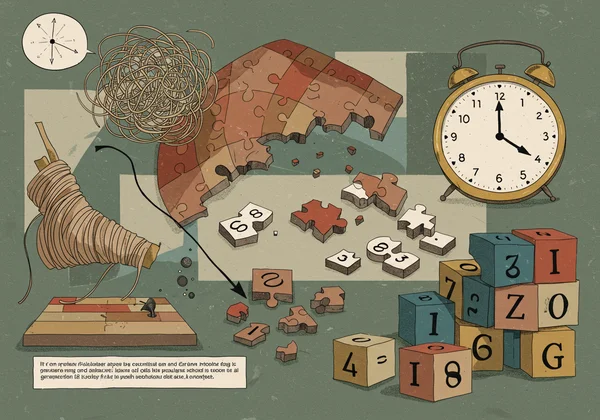ADHD or Autism Quiz: Understanding Overlap & Key Differences
September 7, 2025 | By Julian Navarro
Are you trying to make sense of symptoms that feel like a confusing mix of ADHD and Autism? Many people find themselves wondering, do i have autism or adhd quiz in hand, trying to untangle the threads of their own experiences. The similar traits of Attention-Deficit/Hyperactivity Disorder (ADHD) and Autism Spectrum Disorder (ASD) can make self-understanding a real challenge. This guide navigates the complexities of these neurodevelopmental conditions, exploring their key differences and surprising overlaps, and highlights how a free adhd or autism quiz can be a valuable first step toward clarity.
This journey of self-discovery is important, and finding reliable information is key. While not a diagnostic tool, a well-designed self-assessment can provide the initial insights needed to decide on the next steps. Let’s explore these conditions together and see how an online ADHD quiz can illuminate your path.

Unpacking Neurodiversity: What Are ADHD and Autism?
Before we compare ADHD and Autism, it's helpful to understand them as individual conditions under the umbrella of neurodiversity. Neurodiversity recognizes that brain variations are normal. Conditions like ADHD and ASD are natural differences, not deficits, and understanding this fosters a more supportive perspective.
Defining ADHD: Beyond Just Hyperactivity
Attention-Deficit/Hyperactivity Disorder (ADHD) is a neurodevelopmental condition often characterized by patterns of inattention, hyperactivity, and impulsivity. While many associate ADHD with children who can't sit still, its presentation is far more nuanced, especially in adults and women.
Key traits often include difficulty sustaining focus on tasks that aren't highly engaging, challenges with organization and time management, forgetfulness in daily activities, and a tendency to act on impulse without considering the consequences. For many, it feels like having a race car engine for a brain but with bicycle brakes, creating a constant internal struggle between intention and action. The questions in a good quiz for ADHD are designed to explore these specific challenges.
Defining Autism: A Spectrum of Social & Communication Styles
Autism Spectrum Disorder (ASD) is a developmental condition that affects how individuals perceive the world and interact with others. The term "spectrum" is crucial because it highlights the wide range of strengths and challenges among autistic people. There is no single "look" for autism.
Core characteristics of ASD often involve persistent differences in social communication and interaction, such as difficulty interpreting non-verbal cues like body language or tone of voice. Many autistic individuals also have highly focused interests, a preference for routines, and engage in repetitive behaviors, sometimes called "stimming." They may also experience unique sensory sensitivities, being either over- or under-sensitive to sounds, lights, textures, or smells.
ADHD vs. Autism: Spotting the Key Differences
While there is significant overlap, the core motivations and experiences behind similar behaviors in ADHD and ASD are often different. Understanding these distinctions is crucial for anyone considering an autism vs adhd assessment.

Attention & Focus: Quality vs. Consistency
A primary point of confusion is attention. In ADHD, the challenge is typically regulating attention; it's a matter of consistency. An individual with ADHD can hyperfocus intensely on a topic they find fascinating but struggle to maintain focus on tasks they find mundane or difficult. Their attention is driven by interest and urgency.
In contrast, an autistic person may have an intense, unwavering focus on their specific, focused interests. Their attention isn't necessarily inconsistent; it's highly channeled. They might find it difficult to shift their attention away from that interest, not because they are easily distracted by other things, but because their focus is so deep and specialized.
Social Interaction: Intent vs. Interpretation
Both ADHD and ASD can present social challenges, but they stem from different places. A person with ADHD might struggle socially due to impulsivity—interrupting others, speaking out of turn, or missing social cues because their attention has drifted. The desire for social connection is often strong, but their executive function challenges get in the way.
An autistic individual's social difficulties often arise from a different way of processing social information. They may not intuitively grasp unwritten social rules or may interpret language very literally, leading to misunderstandings. The social intent may be misinterpreted, or they may prefer interacting in ways that feel more direct and less reliant on subtle, non-verbal communication.
Repetitive Behaviors & Interests: Purpose vs. Preference
Repetitive behaviors are a hallmark of Autism, often serving a self-soothing or regulatory purpose (stimming). These behaviors help manage sensory overload or anxiety. Similarly, special interests in Autism are deep, passionate, and form a core part of the person's identity and joy.
In ADHD, repetitive behaviors can manifest as fidgeting to maintain focus or releasing excess energy. Interests can also be intense, but they often cycle more rapidly. An individual with ADHD might dive deep into a new hobby for weeks, only to drop it for something new when the novelty wears off. The pursuit is often driven by a need for dopamine and stimulation.
Shared Symptoms: Understanding the Overlap (ADHD Co-occurring Conditions)
The reason so many people search for an ADHD or Autism quiz is the significant symptom overlap. It's also common for these conditions to co-occur, meaning a person can be both autistic and have ADHD. Recognizing the shared traits is just as important as knowing the differences.
Executive Dysfunction: The Common Thread
Both conditions often involve significant challenges with executive dysfunction. This refers to difficulties with the brain's self-management system, including skills like planning, organization, working memory, and emotional regulation. For both autistic individuals and those with ADHD, this can make daily tasks like managing finances, meeting deadlines, or even starting a project feel overwhelming.

Sensory Sensitivities: How Both Conditions Experience the World
Sensory processing differences are common in both ADHD and Autism. An autistic person might be highly sensitive to the tag on their shirt or the hum of fluorescent lights. Similarly, a person with ADHD might feel overwhelmed in a loud, crowded room, making it impossible to focus. Both may also be sensory-seeking, craving intense physical input to feel regulated. Understanding your sensory profile is a key part of self-discovery. If you suspect you have these traits, a free ADHD quiz can be a helpful starting point.
Taking an ADHD or Autism Quiz: Your First Step to Clarity
Navigating this complex landscape of symptoms can feel isolating, but you don't have to do it alone. An online assessment is a private, accessible way to begin organizing your thoughts and experiences.
Why a Self-Assessment Quiz Can Be a Valuable Starting Point
A scientifically-backed self-assessment, like our online ADHD quiz, serves as an invaluable screening tool. It is not a diagnosis. Instead, it provides a structured way to review your traits against established criteria, such as those found in the DSM-5. This can validate your feelings, give you a vocabulary to describe your experiences, and help you decide if pursuing a professional evaluation is the right next step. Start your quiz today to gather these initial insights.

Interpreting Your Quiz Results and Next Steps
After completing an ADHD self-assessment, you'll receive a summary of your responses. This summary highlights areas where your experiences align with common ADHD traits. If your results indicate potential ADHD characteristics, the most important next step is to consult a healthcare professional, such as a psychologist, psychiatrist, or qualified therapist. They are the only ones who can provide a formal diagnosis after a comprehensive evaluation, which may include interviews, further questionnaires, and a review of your developmental history.
Your Journey Continues
Finding clarity when symptoms of ADHD and Autism overlap can be challenging, but understanding their differences and commonalities is a powerful first step. The journey to self-understanding is unique for everyone, and having the right tools can make all the difference.
While no online quiz can replace a professional diagnosis, this platform offers a free, confidential, and science-backed self-assessment to provide preliminary insights into potential ADHD-related traits. It’s a responsible and informative starting point for adults, parents, and teens. If your experiences resonate with what we've discussed, we invite you to take our quiz today and begin your journey toward greater self-awareness.
Disclaimer: This article is for informational purposes only and does not constitute medical advice. The online quiz is a screening tool and not a substitute for a professional diagnosis. Please consult a qualified healthcare provider for any health concerns.
Frequently Asked Questions About ADHD & Autism Overlap
Can an online ADHD or Autism quiz accurately diagnose me?
No, an online ADHD or Autism quiz cannot provide a medical diagnosis. These quizzes are designed as preliminary screening tools. They can help you identify potential traits that may warrant further discussion with a healthcare professional. A formal diagnosis requires a comprehensive evaluation by a qualified clinician who can consider your full history and rule out other conditions.
What if I think I have both ADHD and Autism?
It is entirely possible to have both ADHD and Autism. This is known as AuDHD, and it is becoming more widely recognized. Individuals with both conditions experience a unique blend of traits that can sometimes seem contradictory. A professional experienced in neurodevelopmental conditions can help untangle this complexity and provide a dual diagnosis if appropriate.
How does a quiz for adhd or autism help differentiate symptoms?
A well-designed quiz for adhd focuses specifically on the core criteria for ADHD, such as patterns of inattention, hyperactivity, and impulsivity. While this screening tool is centered on ADHD, by understanding your results, you can see which of your symptoms align more closely with ADHD criteria. This clarity can be a useful piece of information to bring to a doctor when discussing a potential evaluation for either or both conditions.
What are the key signs of ADHD vs Autism in young children?
When considering the signs of ADHD vs Autism in children, the underlying reason for the behavior is key. A child with ADHD might struggle to take turns in a game due to impulsivity, while an autistic child might struggle because it violates their understanding of how the game "should" be played. A concerned parent can use the ADHD quiz for kids (completed with their child in mind) to see if the behaviors align with ADHD patterns, providing a helpful starting point for a conversation with a pediatrician.